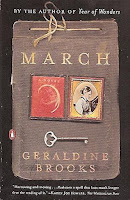Louisa May Alcott’s Little Women ranks among the American classics of fiction. It covers the tribulations of the young March family of sisters as they come of age and begin to navigate the adult world. The young ladies’ father, John March, returns toward the end of the novel from fighting in the Civil War. He is a deeply wounded individual emotionally. At first he struggles even to speak amid the joyous holiday uproar which celebrates and surrounds him.
One can’t say, really, how much demand there might have been for the story of John March. We are all extremely lucky Geraldine Brooks felt the lack, because her brilliant, compendious, and utterly convincing March fills it for all time.
March tracks the progress of John March’s ghastly, harrowing, nearly fatal, journey to the front lines in 1861 Virginia. He sets off as a highly idealistic chaplain, who quickly learns he doesn’t understand the men in his charge, and who in turn do not trust him and ridicule him. He transfers to a plantation which has been converted to a refugee camp for slaves who have been liberated. The central, the searing, episodes of John March’s war experience occur here.
But can such wrenching, epochal events in a man’s life be told without telling their effects on his adoring wife? His self-centered idealism combines with his lack of quotidian skills to force Marmee—on her own—to maintain a home, hold off creditors, raise five daughters during critical years of their lives, and cope with the poverty John’s idealism has plunged them into. When she travels to Washington to try to nurse him to health after his grievous wounds, she learns things about his life—secrets—which astonish and infuriate her.
Which brings us to Grace Clement, the gracious, soft-spoken slave whose father was a plantation owner. She shows both John and Marmee the path to postwar life: one must hew it with love, light it with understanding, and smooth it with forgiveness. Her presence provides the book with a beacon; her very name provides hope.
A book so full of brilliances: the gracious 19th-Century diction which never gets in the way; the appalling treatment of slaves by both sides; the insight that abolitionists probably made up similar percentages of combatants in each opposing army; the kindness and wisdom flowing from an unexpected quarter; the chaos, callousness, and contagion of war. Its central power, as in all excellent, brilliant fiction, flows from the foolish hopes and then the grace under fire of transformed human beings. Superb.
One can’t say, really, how much demand there might have been for the story of John March. We are all extremely lucky Geraldine Brooks felt the lack, because her brilliant, compendious, and utterly convincing March fills it for all time.
March tracks the progress of John March’s ghastly, harrowing, nearly fatal, journey to the front lines in 1861 Virginia. He sets off as a highly idealistic chaplain, who quickly learns he doesn’t understand the men in his charge, and who in turn do not trust him and ridicule him. He transfers to a plantation which has been converted to a refugee camp for slaves who have been liberated. The central, the searing, episodes of John March’s war experience occur here.
But can such wrenching, epochal events in a man’s life be told without telling their effects on his adoring wife? His self-centered idealism combines with his lack of quotidian skills to force Marmee—on her own—to maintain a home, hold off creditors, raise five daughters during critical years of their lives, and cope with the poverty John’s idealism has plunged them into. When she travels to Washington to try to nurse him to health after his grievous wounds, she learns things about his life—secrets—which astonish and infuriate her.
Which brings us to Grace Clement, the gracious, soft-spoken slave whose father was a plantation owner. She shows both John and Marmee the path to postwar life: one must hew it with love, light it with understanding, and smooth it with forgiveness. Her presence provides the book with a beacon; her very name provides hope.
A book so full of brilliances: the gracious 19th-Century diction which never gets in the way; the appalling treatment of slaves by both sides; the insight that abolitionists probably made up similar percentages of combatants in each opposing army; the kindness and wisdom flowing from an unexpected quarter; the chaos, callousness, and contagion of war. Its central power, as in all excellent, brilliant fiction, flows from the foolish hopes and then the grace under fire of transformed human beings. Superb.


















